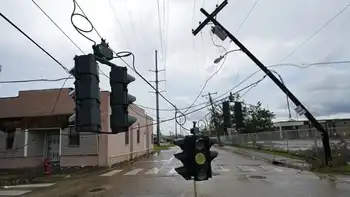Fears fade on hybrid batteries
By New York Times
Substation Relay Protection Training
Our customized live online or in‑person group training can be delivered to your staff at your location.

- Live Online
- 12 hours Instructor-led
- Group Training Available
The car now has more than 130,000 miles.
“I wanted to make a statement about reducing our dependence on dinosaur gunk,” Mr. Finlay, 66, said.
That commitment led him to become an early adopter of hybrid vehicles. It also gave Mr. Finlay, of South Orange, N.J., the opportunity to face what many skeptics predicted would be the AchillesÂ’ heel of battery-electric cars: replacement of the high-voltage battery pack that powers the car at low speeds.
Hybrid critics have long said that the cost of a new battery, if it failed after the carÂ’s warranty expired, would quickly wipe out an ownerÂ’s years of savings on gasoline. The argument was not unreasonable, given the high (and at first, uncertain) cost of the battery packs, which had yet to prove their durability in real-world driving.
That situation has changed since hybrids went on sale in the United States a decade ago. Both Honda and Toyota, the market leaders, now have considerable hybrid experience. And both have recently reduced the prices of replacement nickel-metal-hydride battery packs — a move made possible by maturing technology and growing sales volumes, they say. Even so, new replacement batteries still cost more than $2,000.
While owners and automakers say that hybrid batteries are proving generally reliable, the packs can reach a point where they will no longer hold a charge. For Mr. Finlay’s Prius, trouble arrived at 80,000 miles with a glowing “check engine” light on the dashboard.
“My mechanic told me he had good and bad news,” he said. “The bad news was that I needed both a radiator and a replacement battery. The good news was that the battery pack was under warranty.” The car was repaired by a Toyota dealer in two days and the battery cost Mr. Finlay nothing.
Toyota has sold more than 960,000 hybrid vehicles in the United States since introducing the Prius in 2000, including some 670,000 Priuses. A Toyota spokesman, John Hanson, said that the company has replaced approximately 350 battery packs on the second-generation Priuses, which were introduced as 2004 models. Nine out of 10, he said, were covered under warranty (10 years or 150,000 miles in some states, eight years or 100,000 miles in others) or insurance settlements from accidents.
Honda has sold more than 220,000 hybrid cars in the United States. Earlier this year, the company issued service bulletins regarding premature battery module failures and extensions of the battery warranty; Honda was concerned that in seven warm-weather states some 2000-4 Insight batteries were being overcharged and overheated during regenerative braking.
Honda would not disclose how many batteries it has replaced; a spokesman, Chris Naughton, said that “replacement rates for parts are proprietary.”
Fuel economy and environmental concerns are not the only incentives that motivate hybrid buyers. Chad Melin, 36, a mortgage banker who lives in Chandler, Ariz., bought his 2002 Honda Insight in part so he could drive solo in freeway carpool lanes. Last year, the battery, still working properly, was replaced under warranty at 45,000 miles.
“It cost me nothing and I picked the car up the same day,” Mr. Melin said. But he has since sold the car. Among his reasons: “I wouldn’t want to own a hybrid with a battery that wasn’t under warranty.”
In some cases, drivers have been alerted to battery problems when a condition that Insight owners call a “recal” begins occurring more frequently. The recal — actually a normal function of the car’s electronics, according to Honda — resets the hybrid electronics to more accurately account for the battery’s charge level. When a recal occurs, no electric motor assist is available and the car is powered by its gas engine alone.
James Frye, a computer programmer from Pleasant Valley, Nev., said that recals started occurring in his car, which he had purchased with a salvage title, at 110,000 miles. He replaced the battery himself, installing a $250 pack he purchased used from an Internet parts supplier. He also bought a Manual Integrated Motor Assist kit sold by www.99mpg.com of North Grosvenordale, Conn.
The company’s owner, Mike Dabrowski, said that the assist kit was designed to solve the recal problem by giving the owner greater control over the battery charging process. With the kit, “I can charge as much as I want or discharge as much as I want,” Mr. Dabrowski said.
Honda has reservations about Mr. Dabrowski’s device. “First and foremost, any modifications that change the assist or recharge characteristics of the powertrain could likely stress components, the battery for example, in a way that is well beyond their intended operating parameters,” said Mr. Naughton of Honda.
Ford has sold more than 81,000 Escape and Mercury Mariner Hybrids since their introduction. According to a Ford spokeswoman, Jennifer Moore, the company has experienced no significant issues with batteries and has replaced only “a very small number,” under warranty. (Ford declined to give an exact number of battery replacements.)
General Motors has big plans for adding battery power to its cars, but at this point it is a newcomer to the hybrid market. A spokesman, Brian Corbett, concedes that GMÂ’s hybrids have not been trouble-free: some 2007 Saturn Vue Green Line owners experienced a voltage drop, and the company began a voluntary recall to replace 9,000 battery packs in 2007 Saturn Vue and Aura hybrids. The recall ended last June.
If there are looming battery failures awaiting owners of current hybrids, it would be logical they might show up first in fleets that accumulate many miles each year. That has not been the experience of Shawn Bowden, general manager of Yellow Cab in Vancouver, British Columbia, who said his fleet had pioneered the use of commercial hybrid vehicles in North America. The company now has nearly 100 hybrids.
“The maintenance on a hybrid is incredibly nothing,” Mr. Bowden said. “They cost more to buy, but you get it back in three years with fuel savings and low maintenance.”
Yellow CabÂ’s hybrids operate around the clock and accumulate very high mileage, more than 300,000 miles in many cases. Mr. Bowden estimated that only four or five hybrid battery packs had been replaced on cars in his fleet. The repair can be delayed several days, he said, because dealers do not keep the bulky packs in stock.
Mr. Bowden said Yellow CabÂ’s first Prius, a very high-mileage 2001 model, was acquired from its driver-owner by Toyota and shipped back to Japan so the company could study wear on the battery pack and the car itself.
The price reductions in hybrid battery packs have been significant. In September the price of a battery for a second-generation Prius was reduced to $2,588, and the first-generation to $2,299, both from $2,985. In June, Honda cut the replacement battery price for the Insight (the original two-seat model was discontinued after the 2006 model year) to $2,000, the Civic Hybrid to $2,200 and the Accord Hybrid to $2,400, all from more than $3,000. All prices are for the battery pack only, not including installation.
The replacement cost for the Ford and Mercury hybrid battery is $6,000. A Ford spokesman, Said Deep, said that the company had “taken out costs” each year, and that by the time customers would have to pay for battery replacements they should be cheaper.
Though the warranties are long and battery pack replacement costs are coming down, some consumers are still concerned theyÂ’re going to get stuck with a very expensive dead battery.
That issue affected the resale price of used hybrid cars at one time, a concern that largely evaporated with the most recent spike in gasoline prices. At one point, a three-year-old Honda Civic Hybrid retained 58 percent of its original price, compared with 60 percent for a nonhybrid Civic of the same year, according to John Blair, chief executive of Automotive Lease Guide, a company that sets resale values for the industry.
“But over the last six months, concern about fuel prices means that hybrids are retaining a greater share of their value,” Mr. Blair said.
“I think you’ll find three-year-old hybrids appreciating, not depreciating,” he added. “In the early days of selling hybrids, we as a company had concerns about battery replacement affecting future resale value. What we found was that it just never materialized as an issue.”
The greater unknown lies with the durability of the lithium-ion packs that will be used in many next-generation plug-in hybrids and battery-electric vehicles. Although it has long been used to power cellphones and laptop computers, lithium-ion is still a largely unproved technology at the scale necessary to power automobiles.











